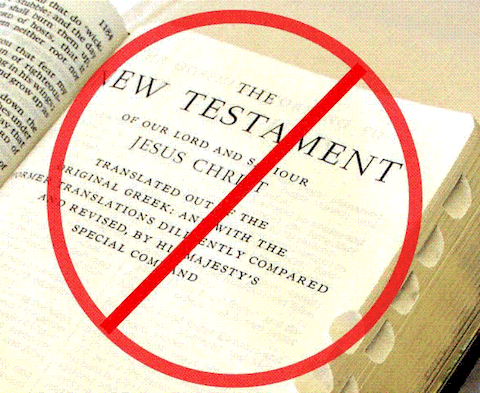
1001 Errors in the Christian Bible
Home
Dedication
Matthew
Mark
Luke
John
Acts
Contact Us
Luke -- Errors 294-300
#294
Luke 2: (KJV)
1 “And it came to pass in those days, that there went out a decree
from Caesar Augustus that all the world should be taxed. 2(And this taxing
was first made when Cyrenius was governor of Syria.)”
Previously in 1:5 “Luke” wrote “THERE was in the days of
Herod, the king of Judaea, a certain priest named Zacharias, of the course
of Abia: and his wife was of the daughters of Aaron, and her name was
Elisabeth.” This Herod is commonly thought to have died in 4 BCE.
Quirinius is commonly thought to have become governor of Syria in 6 CE.
The most popular apologist defense as to why this is not an error in Luke
is that if it was an error in Luke than it would be an error in Luke.
#295
Luke 2: (KJV)
3 “And all went to be taxed, every one into his own city.4 And
Joseph also went up from Galilee, out of the city of Nazareth,”
Compare to Matthew 2: (KJV)
1 “Now when Jesus was born in Bethlehem of Judaea”
According to “Luke” Jesus’ family lived in Nazareth. “Matthew”
sez that Jesus was born in Bethlehem without indicating any move before
the birth to Bethlehem thereby saying that Jesus’ family lived in
Bethlehem.
#296
Luke 2: (KJV)
4 “And Joseph also went up from Galilee, out of the city of Nazareth,
into Judaea, unto the city of David, which is called Bethlehem; (because
he was of the house and lineage of David).”
There is no evidence that any Roman census required participants to report
to their ancestral homes.
#297
Luke 2: (KJV)
5 “To be taxed with Mary his espoused wife, being great with child.”
“Luke’s” entire census story is suspect because it’s
not supported by any other source and the above sentence has the following
problems: There is no evidence that a wife would be required to accompany
a husband for enrollment. One would have expected Mary to be MaryID by
now. One would not expect such a pregnant woman to travel. Under Jewish
law of the time an espoused woman could not travel with her betrothed.
Lukee! Ya got sum splainin ta do. Lukee: Waaah!
#298
Luke 2: (KJV)
7 “And she brought forth her firstborn son, and wrapped him in
swaddling clothes, and laid him in a manger; because there was no room
for them in the inn.”
Compare to Matthew 1: (KJV)
24 “Then Joseph being raised from sleep did as the angel of the
Lord had bidden him, and took unto him his wife:” 25 And knew her
not till she had brought forth her firstborn son: and he called his name
JESUS.”
KJV has translated the “took unto him his wife” literally from
the Greek even though the context probably means “took home his wife”
as some versions translate. Even without the “home” translation
the implication in “Matthew” is that Jesus was born at home.
“Luke” reports that Jesus was born in a manger. The observation
that mangers are where animals are born and that Pagan myths had births
in mangers and heroes with animal qualities has historically held no interest
whatsoever for Christian commentators as near as I can tell.
#299
Luke 2: (KJV)
11 “For unto you is born this day in the city of David a Saviour,
which is Christ the Lord.”
The Greek has no “the” for “Christ the Lord” above.
Once again only Darby’s has “the” in parentheses. The author
likely meant “christ lord” as a title as both words are titles
and the context indicates a title was intended here. When “the”
is added it gives the appearance of changing the “christ” to
a name followed by the title “lord”. “Christ the Lord”
is likely an anachronistic mistranslation as subsequent Christians started
to think of “christ” as a name for Jesus rather than a title.
#300
Luke 2: (KJV)
“15 …Let us now go even unto Bethlehem, and see this thing
which is come to pass,”
The underlying Greek word for what has been translated as “thing”
above means “word”. Apparently Christian translators don’t
like the sound of “see this word which is come to pass” which
indicates a prophecy fulfillment as “Luke” makes no claim that
a virgin birth in Bethlehem fulfilled any prophecy (which is strange by
itself). As the rappers say, the translation is “just a Jesus thang”.